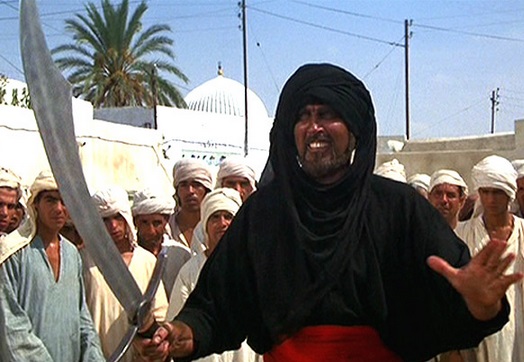It is now just a few hours before the Mayan Long Count calendar ends and, according to apocalyptic aficionados thereof, the
planet Nibiru will shed its Romulan cloaking devices and appear, the Earth's magnetic poles will flip, and dogs and cats will
start living together. For some Muslims (and, indeed,
even a few infidels) striving to find any signs of the coming of the Mahdi, these cosmic catastrophes will lead to the rising of the sun
in the West--one of the major eschatological signs in Islam.
Somehow I doubt all this will come pass--at least
in the next day or so. And I had written, over the course of several hours, earlier, quite a lengthy commentary on the
whole phenomenon of Islamic apocalyptic in relation to Mayan. Alas, as I was nearing the end of that missive, my relatively
new Dell computer was suddenly possessed by al-Dajjal, or one of his minions, and completely froze up--leaving me no recourse
but to shut it off, thus losing all my work. I am now too tired (and disgusted) to try and reconstruct my analysis--especially
considering I have to help the family prep tomorrow for our out-of-state Christmas trip. So for now I must get some sleep
and hope the planet is still here, and relatively unscathed, in the morning. I leave you with clips to my three favorite
end-of-time songs:
1) U2, "
Until the End of the World"
2) The Doors, "
The End"
3) Imagine Dragons, "
Radioactive"
Or, if you'd rather chill (and pray), I suggest Anonymous 4, "
A Mass for the End of Time."
I will be back, soon, with commentary on a new publication by the Iraqi "vice-regent" of the Mahdi,
Ahmad al-Hassan al-Yamani. Assuming we're all still here, of course.
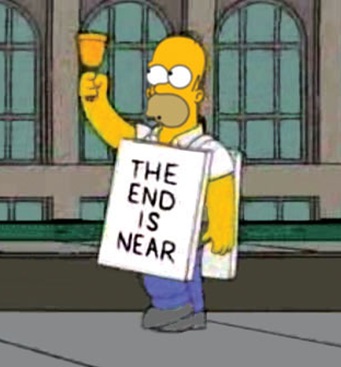
Back in October (2012) I presented "After the End of the World: Modern Christian and Muslim Views of Post-Apocalyptic
History" for the Southeast World History Association conference "
The Ends of the World" at Georgia State University in Atlanta. Herewith is a summary of that presentation.
ἀποκάλυψις ("apocalypse") originally meant "uncovering"--hence the "revelation" of St. John--not
"total destruction." So, lexically, "post-apocalyptic history is not an oxymoron. Furthermore,
even assuming arguendo the "Doomsday Prepper" meaning of apocalypse, it's not accurate to posit that after
said event the planet is necessarily a "wasteland, terrorized by roving bands of irradiated mutants" (and/or zombies). History can go on after the apocalypse--especially in the Islamic view.
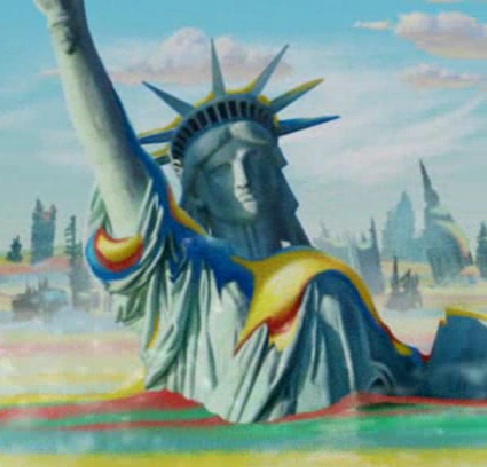
Post-Muslim apocalypse: the US humbled, and Mahdi-provided free snow cones for all (Muslims)!
It's not an oversimplifcation to observe that in Christian thought humans largely cease being historical
actors with the Last Judgement, becoming (mere) objects in the divine plan. But even for those Christians (often Evangelical
Protestants) who separate the Second Coming from the Judgement, usually by making His return and 1,000 year (millennial) reign
precede the latter, history also largely comes to a screeching halt thereby--again, because in the millennium humans are not
masters of their own destiny but pawns (or, if you prefer, sheep) in the God v. Satan conflict. Thus, for two millennia
Christians have been oriented much more toward pre-apocalyptic prognostication than envisioning what the Millennial and/or
New Jerusalem polity would look like: for example, the First Crusaders (1096-1099) hoped to spark Jesus' return
by retaking Jerusalem; and now, over nine centuries later, some Evangelicals want Israel to rebuild the
Temple because they believe that will hotwire His descent.
There are a few exceptions to this pre-apocalyptic
focus: most notably, the 16th c. "
Kingdom of Münster" wherein theocratic and nihilistic Anabaptists established what they claimed was the first outpost of the "New
Jerusalem" (of Revelation 21), albeit with polygamy, decapitations and communism; and, on a far larger level, the "
Taiping Rebellion" in Qing China (1850-64) in which Hong Xiuquan claimed to be Jesus' "younger brother" and led a pseudo-Christian,
apocalyptic movement that may have caused the deaths of as many as 30 million Chinese. (It is also worthy of note that
the Qing government was assisted in putting down this rebellion by a British officer
Charles Gordon--who, two decades later, would be hired by the Ottoman Empire to put down a similar, but Islamic, messianic movement in Sudan!
In that latter case, however, Gordon would be killed.)
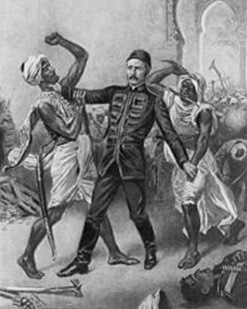 Dervishes to the left, Mahdists to the right--there Gordon is, stuck in the middle with--well, no one.
Dervishes to the left, Mahdists to the right--there Gordon is, stuck in the middle with--well, no one.
Despite these two glaring examples of pre-apocalyptic violence, they are indeed the exceptions and not
the rule in Christian history. Islamic history is another matter entirely, for it is rife with movements led by men
who considered themselves
al-Mahdi, the "divinely-guided" one predicted in several hadiths
(alleged
sayings of Muhammad), albeit absent from the Qur'an. The job of the Mahdi--or, for the largest branch of Shi`is, the
returned Twelfth Imam (the last male descendant of Muhammad, believed to have gone into occultation over a millennium
ago)--is to usher in the global rule of Islam and he operates entirely within the normal run of space-time. Thus, Morocco's
Ibn Tumart (d. 1130 AD), Sudan's Muhammad Ahmad (d. 1885) and Saudi Arabia's Muhammad al-Qahtani (d. 1979) on the Sunni side;
and all the Egyptian Fatimid caliphs (969-1171 AD), as well as the Safavid Shahs of Iran (1501-1722) on the Shi`i one considered
themselves Allah-directed architects of the burgeoning, eventually global, Islamic state. And this state would exist
(so they all thought) for some considerable period of time before the actual End, the Last Trumpet and the queuing up for
judgement. The modern rulers of Iran likewise see themselves as creating the "Mahdist state in microcosm"
which will serve as a "vanguard" for the emergence and coming rule of the Imam al-Mahdi. Thus, in Islamic
messianic thought human efforts
within history--primarily
jihad in all its range of meaning and activity,
from (mere)
da`wah, or "propagation," to holy war--are capable of influencing the eschatological timetable
and helping erect the foundation of
al-malakut Allah, "the kingdom of Allah." In a very real sense
the Mahdi is apocalyptic, then, because Allah is revealing to him how he should proceed with Islamizing the planet.
This is a major difference from the historical Christian view of apocalypse and history in which, as aforementioned, the post-apocalyptic
Kingdom can only be established by Christ Himself once He returns--and not by any of his followers (or at least any of the
sane ones).
In one very important respect, however, there appears to be convergence between Islam and Christianity
regarding apocalyptic and eschatology: the Evangelical position which "
Christian Zionism" predicates that rebuilding the Temple will allow (force?) Jesus to return is similar to the Muslim view--held
primarily by some jihadist Sunnis and
not, as many commentators allege, by the Twelver Shi`is--of "hotwiring the apocalypse:" using a nuclear weapon against Israel (or the United States) in order to spark
the Mahdi's emergence. This attribution to the ayatollahs of such a belief flies in the face of Twelver Shi`i
teachings and modern Iranian history. In fact, while the Sunni apocalyptic jihadist view most closely resembles modern
Evangelical "Christian Zionism" (although the latter is far less violent), the Twelver Shi`i position most closely
tracks the historical Roman Catholic/Orthodox/Lutheran Christian one--that there is little to nothing humans can do to advance
the messianic timetable, except "prepare and wait."
One major reason for the historical difference between
mainstream, historical Christianity and Islam on this issue had not occurred to me until I heard the presentation (at the
same SEWHA panel) by Professor Matthew Myers of Shorter University, entitled "Surviving the End of Your World: Coping
and Crisis in Early Christian Communities." Prof. Myers elucidated the integral role of suffering in the pre-Constantinian
church, which led me to consider two matters: 1) the
unimportance--and, indeed, despising--of suffering in the early
(and modern) Sunni Muslim world, where such is seen as evidence of God's disfavor; and 2) perhaps more importantly, the Sunni
and Shi`i view that salvation is primarily communal--that of the
ummah--whereas in Christianity there is much more
focus on individual soteriology. One might reasonably conclude that Islam's emphasis on the Borg-like success of Islam
in toto lends itself to a more developed historical consciousness regarding the post-apocalyptic world. Also,
the Christian concept of martyrdom is one of suffering and dying for Jesus' sake in the face of persecution, whereas
a "martyr" (
shahid) in Islam is most decidely
not one who suffers placidly
and passively, but who dies fighting
fi sabil Allah ("in the path of Allah")--acting to change history,
one (body) piece at a time. That is quite a significant contrast.
Finally, it's also worthy of note that the Islamic
view of post-apocalyptic history is reminiscent of that held by a near-Church Father,
Origen (d. 254 AD), who "understood history as a process involving the participation of persons in grand events leading to
an eventual culmination or 'end of history.' [BUT] Unlike mainstream Christian eschatology, Origen did not understand the
end of history as the final stage...but rather as the culmination of a human-divine (co-operative) process...."
Johnny Cash's man who comes around will be Jesus Christ; for Sunnis and Shi`is it will be the Mahdi (coming for the first time or returning matters little).
While there are many similarities between the Christian and Muslim views, the even larger differences between Jesus and the
Mahdi have ensured that the world's two largest religions will continue to have quite divergent approaches to the apocalypse--both
what triggers it and what comes in its wake.
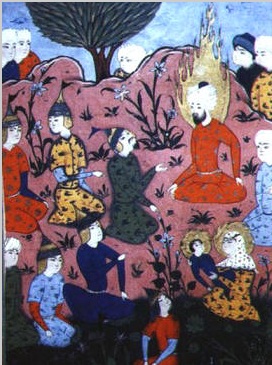 Masih Jesus: "Look, this is really starting to burn me up--YES, I DO like bacon and NO, Muhammad did
NOT get it right!"
Masih Jesus: "Look, this is really starting to burn me up--YES, I DO like bacon and NO, Muhammad did
NOT get it right!"
